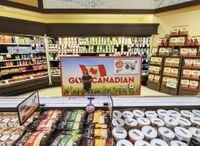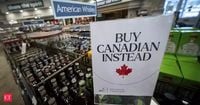As tensions escalate in the ongoing trade war between Canada and the United States, Prime Minister Mark Carney is rallying Canadians to support their homegrown economy through a campaign dubbed the "Buy Canadian Movement." Amidst a backdrop of increasing tariffs imposed by U.S. President Donald Trump, Carney's call to action is resonating with many Canadians who are eager to prioritize local products.
This month, President Trump announced a hefty 25% tariff on Canadian imports, a move that has sparked widespread backlash from Canadian officials and citizens alike. In a passionate statement, Carney remarked, "President Trump wants to break us, so America can own us. We will not let that happen," as reported by Yahoo News. This sentiment has fueled a wave of patriotism, with many Canadians feeling compelled to support their local businesses.
According to a recent poll conducted by Research Co., more than two-thirds of Canadians are prepared to take decisive action against the U.S. tariffs. The survey revealed that 72% of respondents support suspending all steel, aluminum, and wood exports to the United States until Trump rescinds his tariff threats. Similarly, 70% back the idea of halting energy exports to the U.S. until the tariffs are lifted. In addition to these measures, 68% of Canadians believe the government should formally demand an apology from Trump for his comments suggesting Canada could become an American state.
As the trade war unfolds, Carney's government is also contemplating retaliatory tariffs on U.S. goods, which could further escalate tensions. The implications of these tariffs are significant, not just for Canadian consumers but for American businesses as well. With the tariffs in place, American companies importing Canadian goods are facing increased costs, which are likely to be passed on to consumers. This could lead to higher prices for Canadian products in the U.S. market.
In light of these developments, many Canadians are actively seeking to buy local products. A comprehensive list of Canadian brands has been compiled to assist consumers in making informed choices when shopping. Notable Canadian grocery brands include ADL, Agropur, Maple Leaf Foods, and Tim Hortons, among others. Grocery stores are also beginning to label Canadian-made products with a Canadian flag to help shoppers identify local options more easily.
Moreover, the sentiment to support Canadian products extends beyond just groceries. A significant number of Canadians are consciously avoiding American goods, with 64% stating they prefer to purchase non-American alternatives when available. This trend is particularly pronounced among older Canadians, with 66% of those aged 55 and over expressing satisfaction with the government's handling of the tariff situation.
While the Buy Canadian Movement gains traction, some experts caution that buying Canadian and buying local are distinct concepts. Michelle Auger, a Senior Policy Analyst at the Canadian Federation of Independent Business (CFIB), noted that while the movement is encouraging, it is essential to recognize the importance of local businesses that may still carry American products. "Buying Canadian and buying local should be considered different, yet equally important," Auger stated. She emphasized the need for consumers to understand where their money goes and how it impacts the Canadian economy.
As the trade war continues to unfold, the impact is being felt on both sides of the border. Canadian companies are boycotting American goods in response to the tariffs, which is beginning to affect some American businesses. For instance, Jessica Hung, CEO of California-based diaper maker Parasol Co, reported that a deal to expand sales in Canada was canceled due to the heightened tariffs. Similarly, Demeter Fragrances, a small Pennsylvania business, scrapped its plans to enter the Canadian market, deeming it a "wasted effort" due to shifting consumer sentiment.
In the meantime, Canadian companies are seeing a boost in sales as consumers turn away from American products. Jason McAllister, vice president of business operations at Irving Personal Care, reported that their weekly shipments of diapers have quadrupled, indicating a significant shift in consumer behavior.
As Canadians navigate these turbulent economic waters, the desire for enhanced trade relationships with other nations remains strong. A majority of Canadians support exploring trade opportunities with countries such as Australia, New Zealand, and the European Union. The Research Co. poll revealed that 81% of Canadians believe Canada should seriously consider enhancing trade with Australia and New Zealand, while 79% feel similarly about the EU.
The ongoing trade war and the resulting Buy Canadian Movement have not only sparked conversations about national pride but have also led to a reevaluation of consumer habits. As more Canadians express a willingness to support their local economy, the implications for both Canadian and American businesses could be profound.
As the situation develops, it remains to be seen how the U.S. government will respond to the growing discontent in Canada. With another round of tariffs set to go into effect on April 2, 2025, the landscape of international trade between the two nations could shift dramatically. For now, Canadians are rallying together to support their economy and assert their independence in the face of external pressures.








